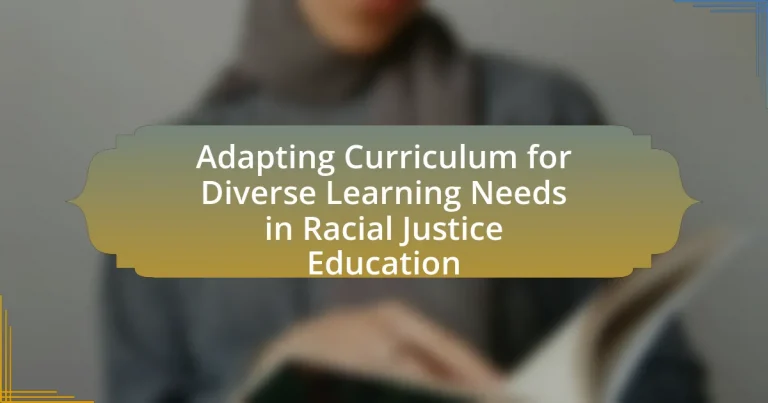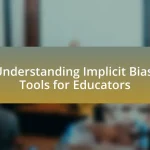Adapting curriculum for diverse learning needs in racial justice education is a critical approach that modifies educational content and teaching strategies to accommodate the varied backgrounds, experiences, and learning styles of students. This article explores the importance of culturally responsive teaching, key principles of racial justice education, and the impact of diverse learning needs on educational effectiveness. It also addresses the challenges educators face in implementing inclusive curricula, strategies for effective adaptation, and the role of community organizations and professional development in supporting these efforts. By emphasizing the necessity of tailored instructional methods and assessment practices, the article highlights best practices for creating equitable learning environments that foster understanding and engagement in discussions surrounding racial justice.
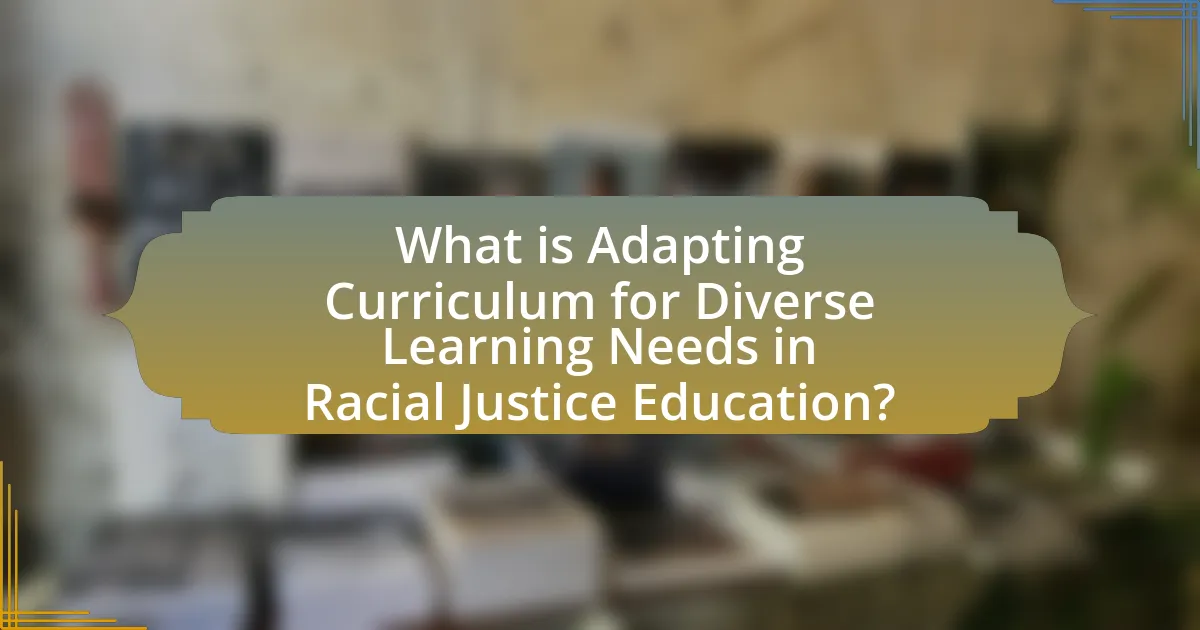
What is Adapting Curriculum for Diverse Learning Needs in Racial Justice Education?
Adapting curriculum for diverse learning needs in racial justice education involves modifying educational content and teaching strategies to address the varied backgrounds, experiences, and learning styles of students. This approach recognizes that students come from different racial, cultural, and socioeconomic contexts, which influence their understanding of racial justice issues. For instance, incorporating multiple perspectives and culturally relevant materials can enhance engagement and comprehension among students from diverse backgrounds. Research indicates that culturally responsive teaching improves academic outcomes and fosters a more inclusive classroom environment, thereby validating the importance of adapting curricula to meet diverse learning needs in the context of racial justice education.
Why is it important to adapt curriculum for diverse learning needs in racial justice education?
Adapting curriculum for diverse learning needs in racial justice education is crucial to ensure equitable access to knowledge and foster inclusive environments. This adaptation acknowledges that students come from varied backgrounds, experiences, and learning styles, which significantly influence their understanding of racial justice issues. Research indicates that culturally responsive teaching improves student engagement and academic performance, particularly among marginalized groups. For instance, a study by Gay (2010) highlights that when curricula reflect students’ cultural contexts, it enhances their connection to the material, leading to deeper comprehension and critical thinking about racial justice. Therefore, adapting the curriculum is essential for promoting understanding, empathy, and active participation in discussions surrounding racial equity.
What are the key principles of racial justice education?
The key principles of racial justice education include equity, inclusivity, critical consciousness, and social action. Equity ensures that all students have access to the same educational opportunities, regardless of their racial or ethnic backgrounds. Inclusivity promotes the representation of diverse perspectives and experiences in the curriculum, fostering a sense of belonging for all students. Critical consciousness encourages students to analyze and challenge systemic inequalities and injustices. Social action empowers students to engage in activism and advocacy for racial justice, applying their learning to real-world contexts. These principles are supported by educational frameworks that emphasize the importance of culturally relevant pedagogy and the need for systemic change in educational institutions.
How do diverse learning needs impact the effectiveness of racial justice education?
Diverse learning needs significantly impact the effectiveness of racial justice education by necessitating tailored instructional strategies that accommodate various learning styles and backgrounds. When educators recognize and address these diverse needs, they enhance engagement and comprehension among students, leading to a more profound understanding of racial justice issues. For instance, research indicates that differentiated instruction, which adapts teaching methods to meet individual student needs, can improve academic outcomes and foster critical thinking about social justice topics. A study by Tomlinson (2001) highlights that students who receive instruction tailored to their learning preferences demonstrate higher levels of motivation and achievement, thereby reinforcing the importance of adapting curricula in racial justice education to ensure all students can participate meaningfully.
What challenges exist in adapting curriculum for diverse learning needs?
Adapting curriculum for diverse learning needs presents challenges such as ensuring inclusivity, addressing varying learning styles, and meeting specific educational requirements. These challenges arise because educators must balance the need for a standardized curriculum with the necessity to tailor content to individual student needs, which can lead to inconsistencies in educational delivery. Research indicates that approximately 15% of students have learning disabilities, necessitating specialized approaches that may not align with traditional teaching methods. Additionally, cultural differences can impact students’ engagement and comprehension, requiring educators to integrate culturally relevant materials and perspectives. This complexity underscores the importance of ongoing professional development for teachers to effectively navigate these challenges and create equitable learning environments.
How do cultural differences influence learning styles?
Cultural differences significantly influence learning styles by shaping how individuals perceive, process, and engage with information. For instance, collectivist cultures often emphasize group learning and collaboration, leading to preferences for cooperative learning environments, while individualistic cultures may favor independent study and self-directed learning. Research by Hofstede (1980) highlights that cultural dimensions, such as individualism versus collectivism, directly impact educational approaches and learning preferences. Additionally, studies indicate that students from different cultural backgrounds may respond variably to instructional methods, with some cultures valuing rote memorization and others prioritizing critical thinking and discussion-based learning. This evidence underscores the necessity of adapting educational curricula to accommodate diverse cultural learning styles, particularly in contexts like racial justice education, where inclusivity is paramount.
What barriers do educators face in implementing inclusive curricula?
Educators face several barriers in implementing inclusive curricula, including lack of training, insufficient resources, and systemic biases. Research indicates that many teachers report feeling unprepared to address diverse learning needs due to inadequate professional development opportunities, which limits their ability to create inclusive environments. Additionally, schools often lack the necessary materials and support systems to effectively implement inclusive practices, leading to disparities in educational access. Systemic biases within educational institutions can further hinder efforts to adapt curricula, as they may perpetuate stereotypes and fail to represent the diverse backgrounds of students. These barriers collectively impede the successful integration of inclusive curricula in racial justice education.
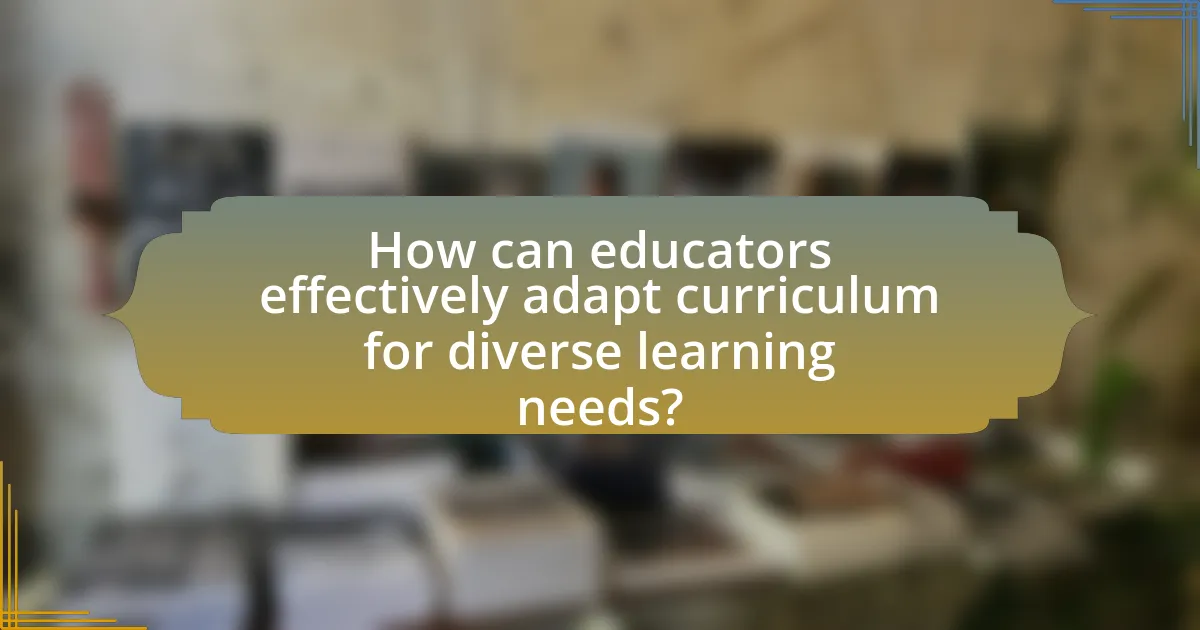
How can educators effectively adapt curriculum for diverse learning needs?
Educators can effectively adapt curriculum for diverse learning needs by implementing differentiated instruction strategies that cater to various learning styles and abilities. This approach involves assessing students’ individual strengths and weaknesses, then tailoring lessons to meet those specific needs. Research indicates that differentiated instruction can lead to improved student engagement and achievement, as evidenced by a study published in the “Journal of Educational Psychology,” which found that students in differentiated classrooms showed higher levels of motivation and academic performance compared to those in traditional settings. Additionally, incorporating culturally relevant materials and perspectives into the curriculum can enhance inclusivity and relevance, fostering a more equitable learning environment.
What strategies can be employed to create an inclusive curriculum?
To create an inclusive curriculum, educators can employ strategies such as integrating diverse perspectives, utilizing culturally relevant materials, and implementing differentiated instruction. Integrating diverse perspectives ensures that students from various backgrounds see themselves reflected in the curriculum, which fosters a sense of belonging and engagement. Utilizing culturally relevant materials involves selecting texts and resources that represent a wide range of cultures and experiences, thereby validating students’ identities and experiences. Implementing differentiated instruction allows educators to tailor learning experiences to meet the varied needs of students, accommodating different learning styles and abilities. Research indicates that inclusive curricula can enhance student engagement and achievement, as evidenced by studies showing improved academic outcomes for students in diverse learning environments.
How can differentiated instruction be applied in racial justice education?
Differentiated instruction can be applied in racial justice education by tailoring teaching methods and materials to meet the diverse needs of students, ensuring equitable access to learning. This approach involves assessing students’ backgrounds, interests, and learning styles to create inclusive lesson plans that address various perspectives on racial justice. For example, educators can provide multiple formats for content delivery, such as visual aids, discussions, and hands-on activities, which cater to different learning preferences. Research indicates that when students engage with materials that reflect their identities and experiences, such as literature from diverse authors or case studies on social justice movements, they are more likely to connect with the subject matter and develop critical thinking skills. This method not only fosters a deeper understanding of racial issues but also promotes empathy and social awareness among students.
What role does culturally responsive teaching play in curriculum adaptation?
Culturally responsive teaching plays a crucial role in curriculum adaptation by ensuring that educational content is relevant and reflective of the diverse cultural backgrounds of students. This approach enhances student engagement and learning outcomes by incorporating students’ cultural references into the curriculum, which fosters a sense of belonging and validation. Research indicates that when curricula are adapted to include culturally relevant materials, students demonstrate improved academic performance and increased motivation. For instance, a study by Ladson-Billings (1994) found that culturally relevant pedagogy positively impacts students’ academic success and cultural identity. Thus, culturally responsive teaching is essential for creating an inclusive curriculum that meets the diverse learning needs of all students in the context of racial justice education.
How can assessment methods be adapted to meet diverse learning needs?
Assessment methods can be adapted to meet diverse learning needs by incorporating varied formats, such as formative assessments, project-based evaluations, and alternative testing methods. These adaptations allow educators to address different learning styles and abilities, ensuring that all students can demonstrate their understanding effectively. For instance, research by Tomlinson (2001) emphasizes the importance of differentiated assessment strategies, which can include visual, auditory, and kinesthetic elements tailored to individual preferences. Additionally, providing options for students to express their knowledge through presentations, written reports, or creative projects can enhance engagement and comprehension. This approach not only supports diverse learners but also aligns with principles of equity in education, as highlighted in the “Every Student Succeeds Act” (ESSA), which advocates for inclusive practices that cater to the unique needs of all students.
What types of assessments are most effective for diverse learners?
Formative assessments are most effective for diverse learners. These assessments, which include observations, quizzes, and discussions, allow educators to gauge understanding in real-time and adjust instruction accordingly. Research indicates that formative assessments can significantly enhance learning outcomes, particularly for students from varied backgrounds, by providing immediate feedback and fostering a growth mindset. A study by Black and Wiliam (1998) found that formative assessment practices can lead to substantial improvements in student achievement across diverse populations.
How can feedback be tailored to support individual learning needs?
Feedback can be tailored to support individual learning needs by personalizing it based on each learner’s strengths, weaknesses, and learning styles. This approach involves assessing students’ prior knowledge and ongoing performance to provide specific, actionable insights that resonate with their unique contexts. For instance, differentiated feedback can be implemented through varied formats such as verbal discussions, written comments, or visual aids, depending on what best suits the learner’s preferences. Research indicates that personalized feedback enhances student engagement and motivation, leading to improved learning outcomes, as evidenced by studies showing that tailored feedback can increase academic performance by up to 30% in diverse educational settings.
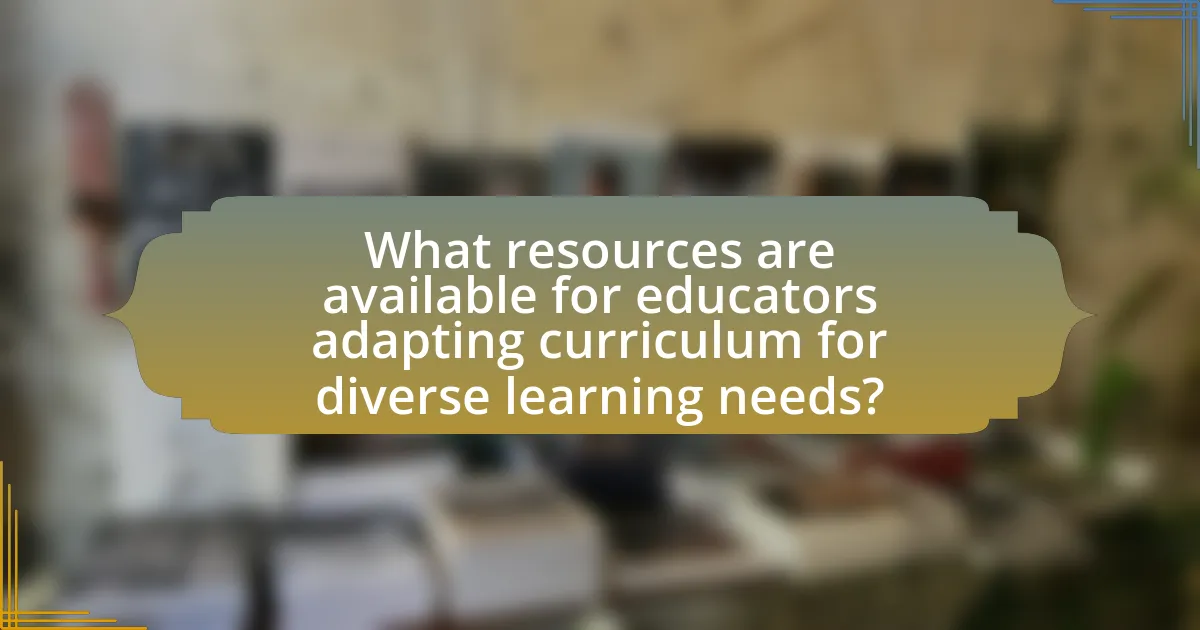
What resources are available for educators adapting curriculum for diverse learning needs?
Educators adapting curriculum for diverse learning needs can access a variety of resources, including specialized training programs, instructional materials, and online platforms. For instance, organizations like the National Center for Learning Disabilities provide guidelines and tools tailored for diverse learners. Additionally, the Universal Design for Learning framework offers strategies to create inclusive educational environments. Research indicates that differentiated instruction techniques, supported by resources from the Association for Supervision and Curriculum Development, enhance learning outcomes for students with varied needs. These resources collectively empower educators to effectively address the unique challenges faced by diverse learners in the context of racial justice education.
What types of professional development are beneficial for educators?
Effective professional development for educators includes workshops focused on culturally responsive teaching, training in differentiated instruction, and collaborative learning communities. Culturally responsive teaching workshops equip educators with strategies to engage diverse student populations, enhancing their ability to address racial justice issues in the classroom. Training in differentiated instruction allows educators to tailor their teaching methods to meet the varied learning needs of students, promoting equity in education. Collaborative learning communities foster ongoing dialogue and support among educators, enabling them to share best practices and resources related to adapting curricula for diverse learners. Research indicates that these types of professional development lead to improved student outcomes and greater teacher efficacy in addressing the complexities of racial justice education.
How can educators access materials that support racial justice education?
Educators can access materials that support racial justice education through various online platforms, educational organizations, and community resources. Websites such as Teaching Tolerance, which is part of the Southern Poverty Law Center, offer free resources, lesson plans, and professional development focused on racial justice. Additionally, organizations like the Zinn Education Project provide teaching materials that emphasize the importance of social justice and equity in history education. Furthermore, local libraries and educational institutions often curate collections of books and multimedia resources that address racial justice topics, making them accessible for educators seeking to enhance their curriculum.
What role do community organizations play in providing resources?
Community organizations play a crucial role in providing resources by facilitating access to educational materials, support services, and community engagement opportunities. These organizations often collaborate with schools and educational institutions to develop tailored resources that address the specific needs of diverse learners, particularly in the context of racial justice education. For instance, studies have shown that community organizations can enhance curriculum effectiveness by offering culturally relevant teaching materials and training for educators, thereby improving student engagement and learning outcomes.
What best practices should educators follow when adapting curriculum?
Educators should prioritize inclusivity and cultural relevance when adapting curriculum. This involves integrating diverse perspectives and materials that reflect the experiences of various racial and ethnic groups. Research indicates that culturally responsive teaching enhances student engagement and academic success, as shown in the study “Culturally Responsive Teaching: Theory, Research, and Practice” by Geneva Gay, which highlights the positive impact of culturally relevant pedagogy on student outcomes. Additionally, educators should employ differentiated instruction strategies to meet the varied learning needs of students, ensuring that all learners can access and engage with the curriculum effectively.
How can collaboration with colleagues enhance curriculum adaptation?
Collaboration with colleagues enhances curriculum adaptation by facilitating the sharing of diverse perspectives and expertise, which leads to more inclusive and effective educational strategies. When educators work together, they can identify and address the unique needs of their students, particularly in the context of racial justice education, where understanding varied cultural backgrounds is crucial. Research indicates that collaborative teaching practices can improve student engagement and learning outcomes, as seen in studies like “Collaborative Learning in Higher Education: A Review of the Literature” by Johnson and Johnson, which highlights the benefits of teamwork in educational settings. This collaborative approach allows for the development of a curriculum that is responsive to the diverse learning needs of all students, ensuring that educational content is relevant and equitable.
What are the key considerations for ongoing curriculum evaluation?
Key considerations for ongoing curriculum evaluation include alignment with educational standards, responsiveness to student needs, and incorporation of diverse perspectives. Ensuring that the curriculum meets established educational standards guarantees that learning objectives are being effectively addressed. Responsiveness to student needs involves regularly assessing student performance and feedback to adapt teaching methods and materials accordingly. Incorporating diverse perspectives is crucial in racial justice education, as it enriches the curriculum and fosters an inclusive learning environment. Research indicates that curricula that reflect diverse viewpoints enhance student engagement and understanding, thereby improving educational outcomes.
What practical tips can educators implement for successful curriculum adaptation?
Educators can implement several practical tips for successful curriculum adaptation, including conducting a needs assessment to identify diverse learning requirements. This assessment allows educators to tailor content and teaching methods to meet the specific needs of all students, ensuring inclusivity. Additionally, incorporating culturally relevant materials can enhance engagement and understanding, as research shows that students perform better when they see their own cultures reflected in the curriculum. Collaborating with colleagues to share strategies and resources fosters a supportive environment for adaptation. Lastly, utilizing formative assessments helps educators monitor student progress and adjust instruction accordingly, which is essential for effective curriculum adaptation.
